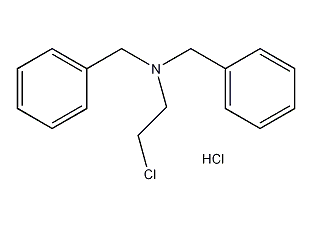N-(2-chloroethyl)dibenzylamine hydrochloride

Structural formula
| Business number | 016U |
|---|---|
| Molecular formula | C16H18ClN·HCl |
| Molecular weight | 296.23 |
| label |
Dibenzylaminoethane chloride hydrochloride |
Numbering system
CAS number:55-43-6
MDL number:MFCD00012518
EINECS number:200-234-5
RTECS number:HQ6825000
BRN number:None
PubChem number:24857529
Physical property data
1. Character:White crystalline powder.
2. Density (g/mL,25/4℃): 1.250
3. Relative vapor density (g/mL,air=1): Undetermined
4. Melting point (ºC): SPAN>192
5. Boiling point (ºC,Normal pressure): Undetermined
6. Boiling point (ºC,5.2kPa): Undetermined
7. Refractive index: Undetermined
8. Flashpoint (ºC): Undetermined
9. Specific optical rotation (º): Undetermined
10. Autoignition point or ignition temperature (ºC): Undetermined
11. Vapor pressure (kPa,25ºC): Undetermined
12. Saturated vapor pressure (kPa,60ºC): Undetermined
13. Heat of combustion (KJ/mol): Undetermined
14. Critical temperature (ºC): Undetermined
15. Critical pressure (KPa): Undetermined
16. Oil and water (octanol/Log value of water) partition coefficient: Undetermined
17. Explosion limit (%,V/V): Undetermined
18. Lower explosion limit (%,V/V): Undetermined
19. Solubility:Stable in acidic solutions, but rapidly destroyed in neutral or alkaline solutions. Soluble in dilute acid, 95%Ethanol and propylene glycol are almost insoluble in water.
Toxicological data
1, acute toxicity: mouse abdominal cavity LD50: 75mg/kg; mouse subcutaneous LD50: 400mg/kg; mouse intravenousLD50: 50mg/kg; Feline vein LDLo: 35mg/kg
Ecological data
None
Molecular structure data
5. Molecular property data:
1. Molar refractive index:78.12
2. Molar volume (m3/mol):234.6
3. isotonic specific volume (90.2K):599.7
4. Surface Tension (dyne/cm):42.7
5. Polarizability(10-24cm3): 30.97
Compute chemical data
1. Reference value for hydrophobic parameter calculation (XlogP): None
2. Number of hydrogen bond donors: 1
3. Number of hydrogen bond acceptors: 1
4. Number of rotatable chemical bonds: 6
5. Number of tautomers: none
6. Topological molecule polar surface area 3.2
7. Number of heavy atoms: 19
8. Surface charge: 0
9. Complexity: 187
10. Number of isotope atoms: 0
11. Determine the number of atomic stereocenters: 0
12. Uncertain number of atomic stereocenters: 0
13. Determine the number of chemical bond stereocenters: 0
14.NoDetermine the number of stereocenters of chemical bonds: 0
15. The number of covalent bond units: 2
Properties and stability
None
Storage method
This product should be sealed and stored in a cool place.
Synthesis method
None
Purpose
For biochemical research. medicine.
extended-reading:https://www.bdmaee.net/wp-content/uploads/2022/08/37-5.jpgextended-reading:https://www.bdmaee.net/tris3-dimethylaminopropylamine-2/extended-reading:https://www.bdmaee.net/toyocat-dmch-hard-bubble-catalyst-for-tertiary-amine-tosoh/extended-reading:https://www.newtopchem.com/archives/820extended-reading:https://www.bdmaee.net/wp-content/uploads/2022/08/-T-12-tin-catalyst-NT-CAT-T-120–T-12.pdfextended-reading:https://www.newtopchem.com/archives/40275extended-reading:https://www.cyclohexylamine.net/dabco-ne1060-non-emissive-polyurethane-catalyst/extended-reading:https://www.bdmaee.net/fascat2004-catalyst-cas7772-99-8-stannous-chloride/extended-reading:https://www.newtopchem.com/archives/1880extended-reading:https://www.bdmaee.net/dabco-ncm-catalyst-cas110-18-9-evonik-germany/

